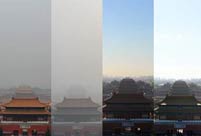BEIJING, Nov. 9 -- China's inflation has risen to a new high since February as the country's economy shows more signs of firming.
The consumer price index (CPI), a main gauge of inflation, grew 3.2 percent year on year in October, up from 3.1 percent in September, the National Bureau of Statistics (NBS) said on Saturday, adding to proof of an improving economy.
In the first 10 months, CPI growth stood at 2.6 percent on average, well below the government's full-year target of 3.5 percent.
Yu Qiumei, a senior statistician with the NBS, said the country's inflation remains generally stable.
Yu attributed the rise in October mainly to a rebound in prices of non-food products, including clothing, home appliances and daily necessities.
Last month, food prices dropped 0.4 percent month on month, while prices of non-food products rose 0.3 percent, according to the NBS.
"CPI growth exceeded 3 percent in September and October, which indicated increasing inflationary pressure," said Kuang Xianming, head of economic research at Hainan's Institute for Reform and Development, adding that the rising inflation was due to the improving economy at home.
Saturday's NBS data also showed China's producer price index (PPI), which measures inflation at the wholesale level, fell 1.5 percent in October from a year ago.
"The reducing PPI means businesses have started to draw down stocks more quickly with increasing interest for investment, and this is also proof that the country's economy is improving," said Kuang.
A string of economic indicators in the past couple of months have suggested a firming economy.
An official survey showed earlier this month that the October Purchasing Managers' Index, a barometer for the health of China's manufacturing activities, hit a new high since May 2012.
Inflation may continue to pick up in coming months due to colder weather and growing demand for food, but it can be kept under control to realize the government's full-year target of 3.5 percent, said Kuang.
"The government should seize the opportunity to advance price mechanism reform as there could be more inflationary pressure in 2014," he suggested.
The much-anticipated Third Plenary Session of the 18th Communist Party of China Central Committee, kicked off here on Saturday, with a discussion on comprehensively deepening reform top on the agenda.
History shows that economic growth tends to be lower after major third plenum meetings. This is because structural reforms, while good in the longer term, tend to slow growth in the near term, noted the latest research report from Britain's Barclays Bank.
In the past month, China's industrial production grew faster, with industrial value-added output expanding 10.3 percent year on year, 0.1 percentage points higher than that of September, according to the NBS.
Of the 41 industrial categories monitored by the bureau, 40 posted year-on-year growth. The manufacturing sector grew 11.4 percent, electric, gas and water production increased 7.6 percent, and mining sector was up 4.3 percent.
With investment and exports gradually recovering, analysts expect industrial production to continue improving.
According to the NBS, China's urban fixed-asset investment expanded 20.1 percent year on year to 35.17 trillion yuan (5.73 trillion U.S. dollars) in the Jan.-Oct. period, down 0.1 percentage points from the growth rate in the first nine months.
Retail sales grew 13 percent year on year to 19.03 trillion yuan in the first 10 months of this year, almost the same as the 12.9-percent growth in the first nine months.
The current growth was still propelled by investment and exports, indicating entrenched problems in the economy have not been sorted out, according to a report released by Ccidnet, a consulting company.
In the mid- and long-term, industrial production may experience a minor contraction, the report said.
The Chinese leadership is striving to steer its economy with a slower, more sustainable growth model based on domestic consumption instead of investment and exports.
 Luxury-cars parade held in Dubai
Luxury-cars parade held in Dubai Special forces take tough training sessions
Special forces take tough training sessions Fire guts 22-storey Nigeria commercial building in Lagos
Fire guts 22-storey Nigeria commercial building in Lagos A girl takes care of paralyzed father for 10 years
A girl takes care of paralyzed father for 10 years A record of Beijing air quality change
A record of Beijing air quality change In pictures: explosions occur in Taiyuan
In pictures: explosions occur in Taiyuan Hello! Horror Halloween Celebration!
Hello! Horror Halloween Celebration!  The catwalk to the world of fashion
The catwalk to the world of fashion  Cruise trip to Taiwan
Cruise trip to Taiwan  Maritime counter-terrorism drill
Maritime counter-terrorism drill Loyal dog waits for master for six months
Loyal dog waits for master for six months Oriental education or western education?
Oriental education or western education? China in autumn: Kingdom of red and golden
China in autumn: Kingdom of red and golden National Geographic Traveler Photo Contest
National Geographic Traveler Photo Contest Chinese screen goddesses from Beijing Film Academy
Chinese screen goddesses from Beijing Film Academy Day|Week|Month